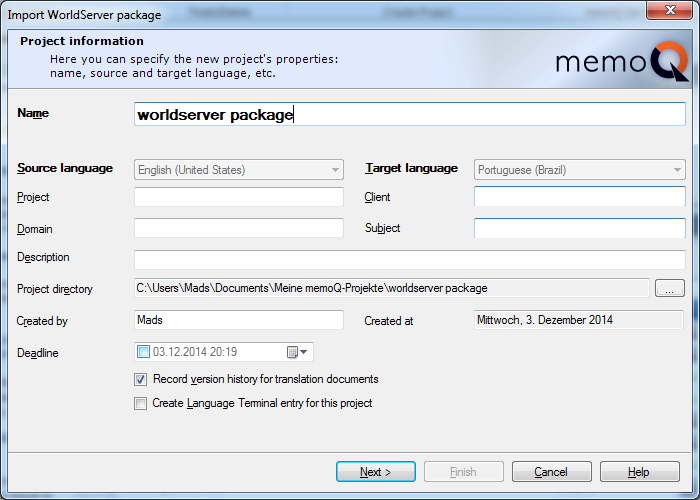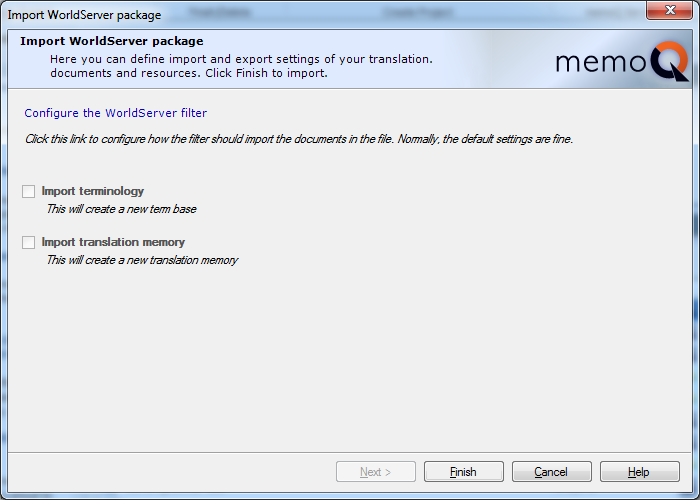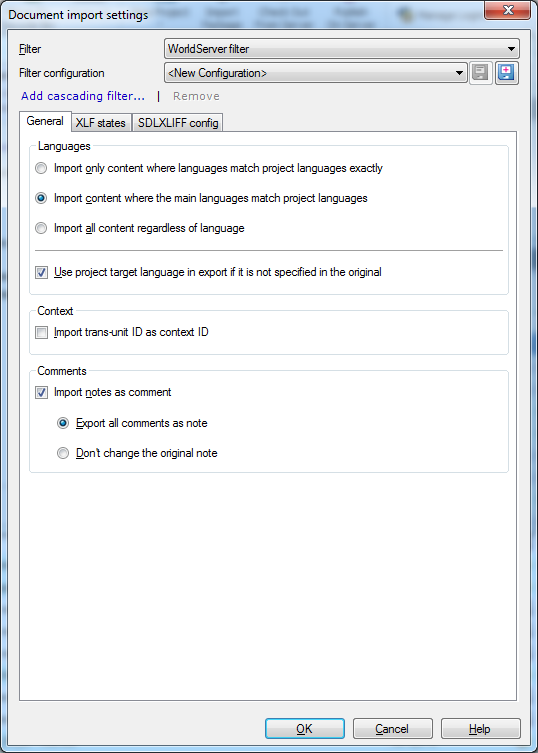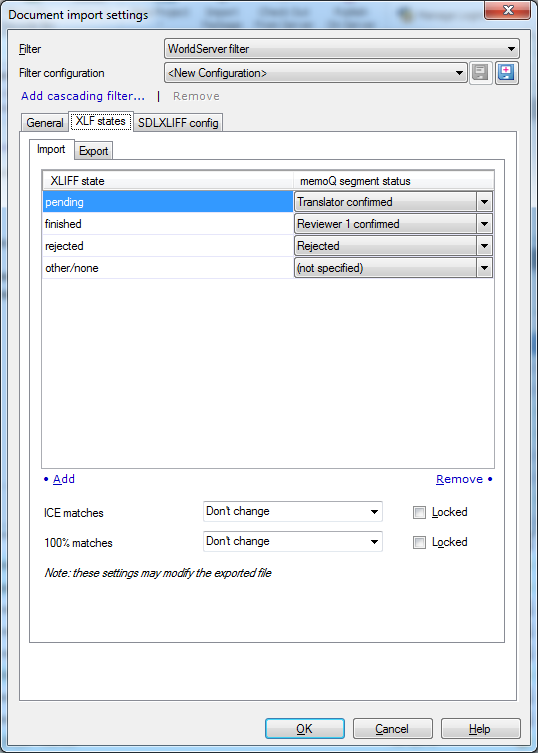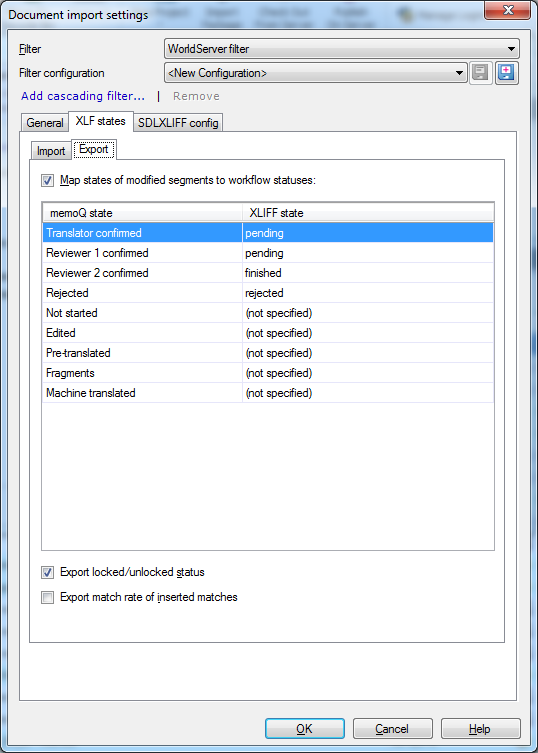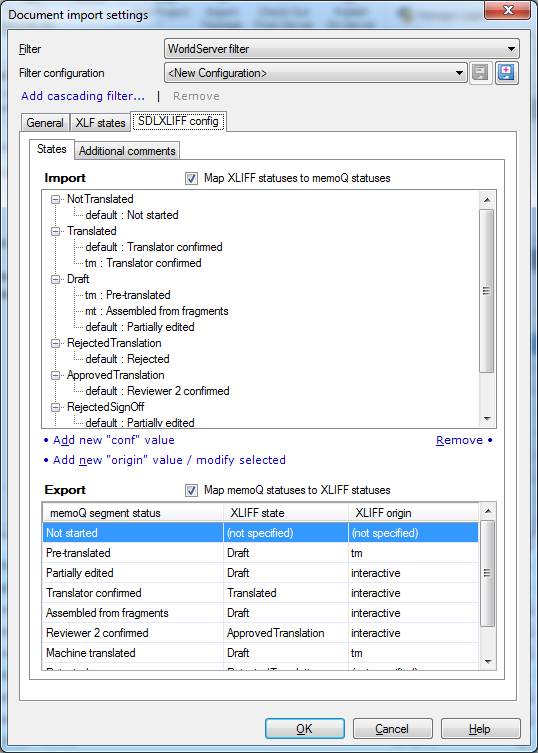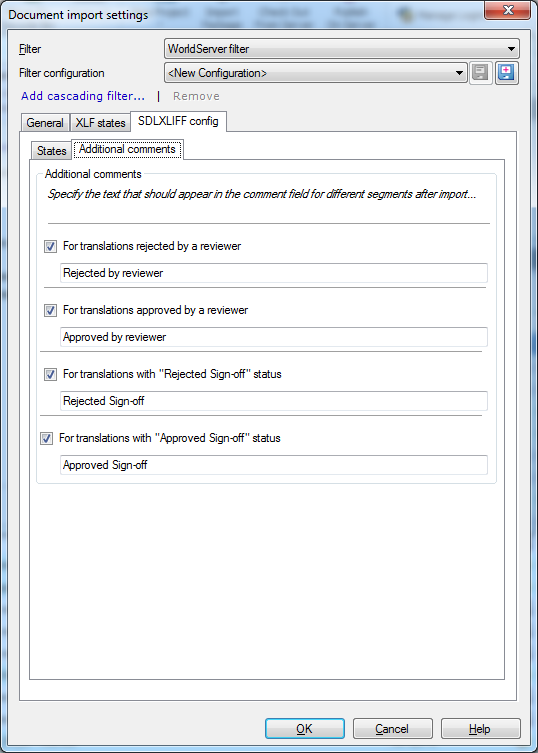|
SDL Worldserver files (*.xlz or *.wsxz) are XLIFF based and can be processed in memoQ. memoQ enables you to import this package format directly into a memoQ project. Importing a SDL WorldServer package into a local projectOn the Project ribbon tab, choose Import Package > WorldServer Package. After locating and selecting the WorldServer file, the Import WorldServer package wizard starts. In this wizard, you can specify a name and location for the memoQ project that will contain the information extracted from the package. This wizard is similar to the New memoQ project Wizard. Step 1: Project information
The first page of the Import WorldServer package wizard is similar to the Project information page of the New memoQ project wizard. memoQ automatically suggests a project name and fills in the languages. The Project, Client, Domain and Subject values are also inherited from the SDL Studio project. You can change the details here. Click Next to proceed to Step 2.
In the second page, the resources are imported. The Import terminology and Import translation memory check boxes are enabled by default. Uncheck them if you do not want to import the translation memories and terminology which are included in the Idiom package. If the package contains a TMX file, then memoQ creates a new TM and imports the contents from the TMX file. If the package contains a TBX file, then memoQ creates a new TB and imports the contents from the TBX file. Note: memoQ creates the term base with the name of the source file, and imports the following meta-information: definition (language level), creator, creation date, modifier, modification date, part of speech and the forbidden status. memoQ only imports the project languages and those languages which have the same major languages as one of the project languages. Click the Configure the WorldServer filter link to configure the XLZ filter in the Document import settings. If the package contains SDLXLIFF files, then the configuration link directs you to the SDLXLIFF import filter settings. Converter configurationGeneral tab:
Languages section: •Import only content where languages match project languages exactly: Select this radio button to import only those file sections of the XLIFF file, where the language pair is exactly the same as the project's languages. •Import content where the main languages match project languages: Select this radio button to import only those file sections of the XLIFF file where the language pair matches the project's languages, but allowing different sub-languages. This is the default setting. •Import all content regardless of language: Select this radio button to import every file section of the XLIFF file. •Use project target language in export if it is not specified in the original: Check this check box to apply the target language of the project for those file sections where the target language is not specified. Context section: •Import trans-unit ID as context ID check box: If this check box is checked, memoQ will import translation unit IDs for each segment as a context ID to the segment. This way, for example, you can get additional information on context. Comments section: •Import notes as comment check box: Check this check box to import <note> tags as comments of the type Information in the comment field in memoQ. If this check box is checked, then you can also export comments as note: Select the Export all comments as note radio button to export all comments. You cannot export only individual comments. When you export comments, then the original text in the notes field is overwritten on export. Select the Don't change original note radio button to exclude comments you added in memoQ on file export.
XLF states tab:
On the Import tab, match the XLIFF state from the XLZ files to the memoQ segment status. By default, pending is matched to Translator confirmed; finished to Reviewer 2 confirmed, question/rejected/not specified to Edited. Click the Add link to add a new XLIFF state mapping. The New XLIFF state mapping dialog appears:
Type the state label in the Value in XLIFF "state" attribute box, and select the corresponding memoQ segment status from the drop-down list below. Then click OK to add the new mapping. You can also remove mappings from the list. Simply click the mapping, and click Remove. Caution: memoQ will remove the mapping from the list without asking for confirmation. Select a status, then click the Remove link to remove a status from the mapping list. From the ICE matches drop-down list, choose a memoQ segment status. ICE matches are equivalent to 101% matches in memoQ. You can indicate whether ICE matches should have the Don't change, Translator confirmed, Reviewer 1 confirmed or Reviewer 2 confirmed status in memoQ after import. Check the Locked check box to lock these segments after import. From the 100% matches drop-down list, choose a memoQ segment status. You can indicate whether 100% matches should have the Don't change, Translator confirmed, Reviewer 1 confirmed or Reviewer 2 confirmed status in memoQ after import. Check the Locked check box to log these segments after import.
On the Export tab, you can set the XLIFF state attribute for each memoQ segment status. Click the XLIFF state label next to the segment status for which you want to change the mapping. Type a new XLIFF state label, and press Enter or click away from the edit box. You cannot add new export mappings here because the segment status codes in memoQ form a fixed list. You can also check the Map memoQ states of modified segments to workflow statuses check box to map the states.
Check the Export locked/unlocked status check box to export all locked or unlocked segments. Check the Export match rate of inserted matches check box to export all segments with the originally inserted match rate (the original match rate is not overwritten).
SDLXLIFF config tab:
Here you can map XLIFF states to memoQ states at import and export. Note: If the target cell is empty, the status is Not started; if the target cell is not empty, the status is Edited. States tab: In the Import section, check the Map XLIFF statuses to memoQ statuses check box. In the list below, you see the default states mapping. Click the Add new conf value command link to add a new state:
Enter a conf attribute in the text field next to Value in SDLXLIFF "conf" attribute. Choose a state in the drop-down list for Default memoQ segment status. You can choose: Not started. Translator confirmed, Reviewer 1 confirmed, Reviewer 2 confirmed, Assembled from fragments, Partially edited, Pre-translated, Rejected or Machine Translated. After you created a new conf value, you can add a new origin value to it or modify it. Click the Add new origin value / modify selected command link:
Enter a value in the text field next to Value in SDLXLIFF "origin" attribute. Choose a state in the drop-down list for memoQ segment status. You can choose: Not started. Translator confirmed, Reviewer 1 confirmed, Reviewer 2 confirmed, Assembled from fragments, Partially edited, Pre-translated, Rejected or Machine Translated. Click the Remove command link to remove a state and its mapping. In the Export section, check the Map memoQ statuses to XLIFF statuses check box. In the list below, you see the default states mapping.
Additional comments tab: •For translations rejected by a reviewer, include comment: memoQ will append this to the comment field in memoQ. •For translations approved by a reviewer, include comment:memoQ will append this to the comment field in memoQ. •For translations with "Rejected Sign-off" status, include comment:memoQ will append this to the comment field in memoQ. •For translations with "Approved Sign-off" status, include comment: memoQ will append this to the comment field in memoQ. The appended text will be displayed in triple hash marks, e.g. Rejected by reviewer. Note: When you export the file, the appended text in the comment will be skipped. Note: You can split and join segments in SDLXLIFF files. If you need to make changes to the Idiom filter, use the 3 tabs to configure the filter, then click OK. NavigationClick Finish to proceed with importing the SDL Studio project. Click Cancel to leave the dialog without importing the project. The Idiom package is imported. You can not add additional documents to a project that was created by importing an Idiom package. Note: The Change export path button on the Documents ribbon tab is greyed out for Idiom packages. See also: |
